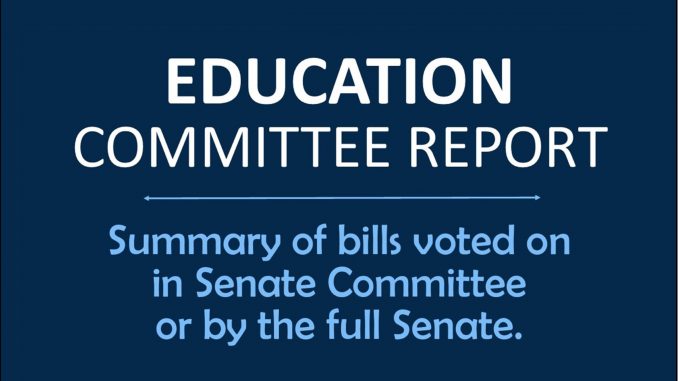
On this page
COMMITTEE ACTION:
SSB 1041 – Temporary School Board Member Compensation Increase
SSB 1041 (SF 130) provides a one-year exception to the $6,000 annual limitation on compensation for a member of a school board. This is in response to COVID-19 staffing shortages and the need/ability for some school board members to pitch in and work for the school district they are serving. The options for school board member employment are limited to this school year and only to these jobs: substitute licensed teacher, food service worker or school bus driver.
[2/21: short form]
SSB 1042 – Rural physician loan repayment program
SSB 1042 (SF 129) adds obstetrics and gynecology as an area of specialization that qualifies for loan repayment under the Rural Physicians’ Loan Repayment Program. Currently, a person can engage in less than full-time practice under the program if they apply to the College Student Aid Commission to amend their program agreement and the commission determines that exceptional circumstances exist. The bill eliminates the exceptional circumstances, thereby allowing the commission and the person to consent to amend the agreement. Under the bill, “less than full-time” means at least 70% of a 40-hour work week. Finally, the bill modifies the definition of “service commitment area” to include a larger area. [2/21: short form]
SF 159 – Vouchers, Charter Schools Omnibus Education Bill
SF 159 is a Governor’s proposal that includes school vouchers, charter schools, elimination of diversity plans, expanding uses of teacher salary funding, eliminating the 90-day athletic eligibility rules and various student data and tax credit measures. These are the main divisions of this bill:
- Vouchers/ “Student Scholarships”: Students in all grades are eligible if attending a “school identified for comprehensive support and improvement under the federal Every Student Succeeds Act,” which are schools in the lowest 5% of Title I schools. There are currently 34 schools on this list. The estimated cost for all eligible students would be $54 million. The Governor proposed funding at $3 million, which would cover 567 students in 34 schools across the state. The unspent funds may be rolled over year to year and can be used for higher education expenses until age 23. The bill explicitly states that the state and local schools may not require a nonpublic school to modify its academic standards to receive payment from parents/guardians under this fund.
- Charter School Expansion: Allows a “founding group” to apply for a charter, independent of public-school agreement. A charter could be within an existing school, or an entire school could convert to a charter. The bill exempts charters from most state statutes, rules and any local regulation or policy applicable to a public school, except for federal and state health and safety, and laws prohibiting discrimination. District must pay to the charter school the total state cost per pupil, TLC and ELL weighting.
- Open Enrollment: Eliminates the 90-day waiting period for athletic eligibility when a student open enrolls. The bill also expands open enrollment options for districts identified in “significant need of improvement” and requires a receiving district to send school vehicles into a contiguous district.
- Eliminates Local Voluntary Diversity Plans: Eliminates ability of a school district with a voluntary diversity plan to deny an open enrollment request.
- Student Data, Program Standards and Funding: The bill requires a new statewide system for student records. It allows the teacher salary supplement to be used for other things if salary obligations are met. It allows transfer of teacher leadership funds to the general fund if all obligations are met.
- Education Tax Credits and Deductions: Doubles the maximum amount a taxpayer may deduct from $250 to $500. The bill increases the tuition and textbook tax credit to apply to homeschool expenses, doubles the amount of the tax credit and doubles the amount of allowed expense.
[1/25: 8-7 (No: Democrats, Cournoyer, Sweeney)]
SF 160 – Mandated In-Person School Requirement
SF 160 mandates all public and non-public schools provide a 100% in-person instruction option during the 2020-2021 school year. The mandate will begin no later than the second Monday following the effective date of the bill and ending June 20, 2021. This requirement is in effected unless explicitly waived in a proclamation by the Governor for emergency health disaster related to COVID-19. The bill continues to allow schools to provide hybrid instruction, but most hybrid instruction plans won’t be logistically possible when schools offer 100% in-person and a 100% online option. Schools must offer parents at least five days to decide if they will select the full-time, in-person instruction option.
For the rest of this school year, schools may apply to the Department of Education to temporarily go 100% online for a two-week period. Considerations for an online waiver include:
- Positivity rate in the county in which the district or building is locate (current criteria from Gov/DE)
- Percentage of student absenteeism (current criteria from Gov/DE)
- Number of teachers who are quarantining due to exposure to COVID (new)
- Scarcity of substitute teachers and school bus drivers (new)
[1/25: 10-5, party-line]
